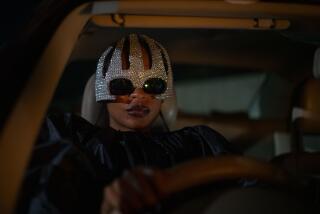‘Carnage’ review: Civilized adults descend into chaos
- Share via
When stage-bound plays become cinematic, expanding them to the broader canvas that film allows is often the order of the day. But not with Roman Polanski and not with “Carnage.”
In fact, one of the things that attracted the veteran director to Yasmina Reza’s award-winning “God of Carnage” was the chance to make a film in the real time of the excruciating evening two couples — Jodie Foster and John C. Reilly, Kate Winslet and Christoph Waltz — spend in a Brooklyn apartment.
So not only is “Carnage” not opened up, it feels even more intensely focused on its quartet of protagonists than the play was. The tight close-ups of cinematographer Pawel Edelman, the way his camera moves within the detailed living space designed by Dean Tavoularis, adds to the let-me-out-of-here claustrophobia of the scenario co-written by Reza and Polanski.
But it wasn’t only the tight confines that likely attracted a filmmaker often drawn to bleak, amoral themes. Reza’s play is a high-style, abrasive comedy of chaos and hostility that mercilessly skewers its characters’ pretensions and aspirations. This kind of material is never going to warm anyone’s heart, but done as well as it is here, this pitiless verbal farce can provide bleak satisfactions of its own.
Not only is Polanski very much in his comfort zone with this material, he also has cast it impressively, staying away from any of the actors who played the parts in either its London or New York productions and finding players who match up well with “Carnage’s” juicy dialogue.
One small place where “Carnage” does allow itself to open up is in a brief, dialogue-less prologue where, in the distance, we see an altercation between two young boys in a Brooklyn park that leads to a moment of violence and to two sets of adults that meet to deal with the aftermath.
Hosting the meeting are the parents of the injured boy. Penelope Longstreet (Foster) is earnestness personified, a bright woman, perhaps wound a bit too tight, who is working on a book about Darfur. Her husband, Michael (Reilly), nominally the picture of easy-going amiability, has the non-glamorous job of wholesaling decorative housewares.
The parents of the perpetrator are rather more upscale. Alan Cowan (Waltz) is a high-powered attorney and his wife, Nancy (Winslet), is an investment broker.
What unites all four parents, at least initially, is the self-satisfied sense they share that “we’re all decent people, all four of us” and therefore perfectly capable of resolving in a grown-up manner the fracas their childish sons have started.
Being an adult, it turns out, is more difficult than anyone anticipates, especially since both sets of couples have unresolved crises of their own they are in the midst of handling.
For Penelope and Michael, it is how to deal with their daughter’s escaped hamster. For Alan and Nancy, it’s the fact that Alan, in the midst of a high-stakes work crisis about the reliability of a controversial prescription drug, thinks nothing of taking multiple cellphone calls at the most inopportune times.
One of “Carnage’s” most interesting conceits takes a page from Luis Buñuel’s classic 1962 “The Exterminating Angel,” which featured guests at a swank dinner party who find that, try as they might, they simply cannot leave the premises. Here, too, the attempt is made more than once to part before things get too savage, but it never quite happens.
In effect imprisoned in this apartment, the two couples attempt to talk things through. But subtle class and character differences gradually emerge and these four people slowly realize they simply can’t stand each other. When the film’s poster calls this “A Comedy of No Manners,” it is telling the truth.
As the thin veneer known as civilized conduct gets peeled away, the worst of human behavior emerges from the shadows. “Carnage” is effective not because it reveals something we don’t already know — it doesn’t — but because it makes us shake our heads in recognition of behavior we’ve seen in others and, heaven forbid, even in ourselves.
More to Read
The biggest entertainment stories
Get our big stories about Hollywood, film, television, music, arts, culture and more right in your inbox as soon as they publish.
You may occasionally receive promotional content from the Los Angeles Times.











